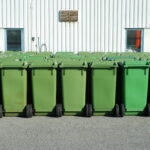EcoRI News recently described Stop & Shop’s efforts to minimize waste in its operations. The Quincy-based company is leading the way for other supermarket chains, utilizing recycling, food donation, and anaerobic digestion initiatives to reduce waste. Each day, delivery trucks transport grocery products to more than 200 Stop & Shop stores in Massachusetts, Connecticut, and…
Waste360 recently reported on an innovative Massachusetts anaerobic digestion (AD) plant that is expanding its capacity for accepting food waste. The expanded facility at Crapo Hill Landfill in New Bedford will begin accepting loose and packaged food for processing, providing an additional outlet for businesses and institutions in the region subject to the Massachusetts Commercial…
A recent Biocycle article describes how new depackaging facilities across Massachusetts are making it easier for businesses to divert packaged food materials from disposal. Packaged foods may be thrown away when they are out-of-date, mislabeled, damaged, or spoiled. To cut down on this avoidable waste, new facilities are being developed to efficiently remove food from…
A recent Waste Dive article discusses the growth of the food recovery marketplace in Massachusetts, including expansion in tons of diverted food waste, quantity of customers served by organics waste haulers, and number of end-sites available for processing food waste. This article was based on a presentation by MassDEP at its Organics Subcommittee meeting held…
Pine Island Farm, a large dairy farm in Sheffield, Massachusetts, recently received one of the American Biogas Council 2017 Biogas Industry Awards for its innovative on-farm anaerobic digestion (AD) facility. Pine Island Farm developed the system to help combat common farming industry concerns such as manure management, groundwater protection, and odor control. Anaerobic digestion represents…
A recent WasteDive article describes how Waste Management’s Centralized Organic Recycling (CORe) facility in Boston is diverting food waste from landfills and preparing it for use as a clean energy source. The compact CORe system provides another outlet for businesses and institutions located in densely populated areas that cannot easily support a large composting facility. Currently,…
In July, BioCycle published a guide to pretreatment of on-site food waste equipment and systems. The article describes three broad categories of equipment: Dehydrators utilize thermal processes to evaporate the liquid present in food waste. Liquefiers use water and enzymes/microbes to reduce the biochemical oxygen demand (BOD) and create wastewater that is usually discharged to…
In the face of a changing dairy market, Barstow’s Longview Dairy Farm in Hadley, MA capitalized on another product from their cows: manure. Manure Manager reports that Vanguard Renewables invested in the construction of an anaerobic digester that allows the farm to repurpose the manure as both fuel and fertilizer while reducing business operation costs.…
The Massachusetts Clean Energy Center (MassCEC) is currently soliciting applications for Technical Services/Technical Studies grants through its Commonwealth Organics-to-Energy program. According to MassCEC, the program intends to “advance the Commonwealth’s goal of substantially increasing the diversion of source-separated organics away from landfilling or incineration.” This funding opportunity is designed to support technical studies regarding the…
Yesterday, the Massachusetts Department of Environmental Protection (MassDEP) released a new report highlighting the positive economic benefits of reducing food waste. This report studied the effects of the Massachusetts Commercial Food Waste Ban, which prohibits businesses and institutions that generate one ton or more of food waste per week from disposing of that waste in…

